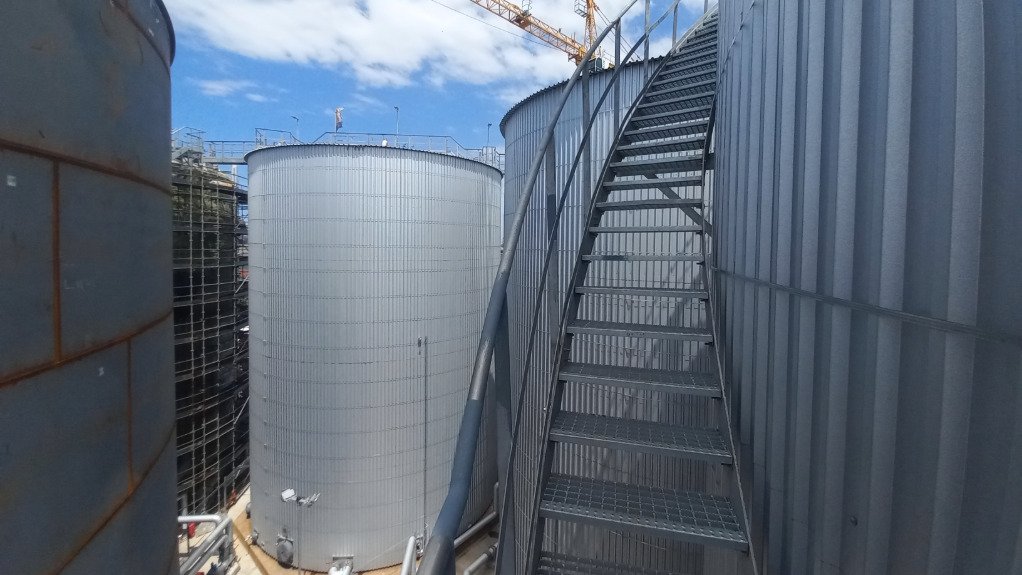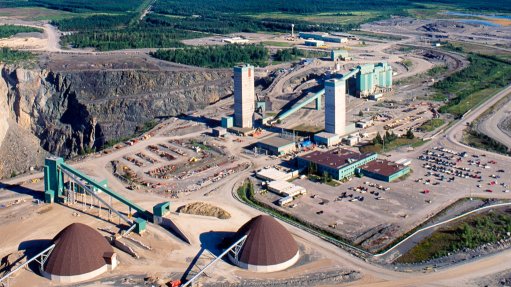Bitumen import terminal bridges supply gap


FILLING THE GAP The recently completed R370-million bitumen import storage facility will serve as the country’s primary import terminal for bitumen
Following the shutdown of local refinery production, independent bulk liquid storage providers FFS Tank Terminals’ recently completed R370-million bitumen storage facility at Maydon Wharf, in the Port of Durban, in KwaZulu-Natal, is set to address South Africa’s bitumen supply gap.
The facility, entailing a purpose-built bitumen pipeline from the quayside to the terminal, along with storage tanks, will serve as the country’s primary import terminal for bitumen. This after South Africa’s last remaining refinery producing bitumen, National Petroleum Refiners of South Africa, ceased operations in July.
“Without this facility, industry would now be facing a ‘bitumen cliff’ similar to the looming ‘gas cliff’,” says oil and gas company, and FFS Tank Terminals parent company FFS Refiners CTO Alistair Wright.
Together with FFS Tank Terminals’ Cape Town facility, the Maydon Wharf site will provide sufficient import capacity to meet the country's bitumen demand for the foreseeable future, he adds.
The project was engineered, constructed and financed by South African companies, including a partnership with bitumen supplier Continental Bitumen Southern Africa.
“Leveraging our global supply chain, we’re dedicated to providing the Southern African road construction industry with a reliable and consistent supply of quality bitumen,” Continental Bitumen Southern Africa CEO Ricardo Louw says.
Construction
FFS adopted a phased approach to the project, which allowed it to swiftly add initial capacity for beneficial operation, meeting immediate customer requirements, while the subsequent second expansion phase will ensure that FFS can meet longer-term demand.
Phase 1 of the project included the construction of three new bitumen storage tanks with a total capacity of 7 500 m3. Following this, construction of Phase 2 began in July last year, which saw FFS commission a further five bitumen tanks, providing an additional 13 000 m3 of specialised heated bulk bitumen import storage and pipelines, with the final tank put into beneficial operation in November.
Phase 2 also included the construction of a new 7 250 m3 tank and the conversion of a further three storage tanks for residual fuel oil to service either marine bunkering or industrial heating fuel.
During Phase 1, all common infrastructure and utilities were designed and installed with the final capacity and throughput requirements in mind. Wright adds that particular emphasis was placed on ensuring the safe operation of Phase 1 during the construction and commissioning of Phase 2.
Moreover, the tie-in points between the two phases were engineered to provide effective isolation during construction, ensuring minimal disruption to operations during integration.
Wright enthuses that Phase 2 was executed efficiently, drawing on the experience and lessons learned from Phase 1’s successful completion.
To optimise efficiency and quality, the steel plate material for the tanks was rolled, abrasive-blasted and coated offsite, mitigating the need for on-site blasting and painting.
Additionally, all piping was prefabricated at FFS Refiners’ workshop, in Sea View, in Durban, into the “largest transportable segments”, which were subsequently painted and delivered to site for assembly.
On site, FFS employed a “modern, efficient tank construction method”, whereby the top strakes and roof were assembled first and then progressively jacked up as lower strakes were added until the desired tank height was achieved. This method allowed for most of the construction to be executed near ground level.
Tank Fabrication
A key consideration in developing the storage tanks was ensuring minimal energy loss, as bitumen is typically stored at temperatures between 150 °C and 160 °C.
To minimise energy loss, the storage tank walls and roofs were insulated using ISOVER QTech low-density mineral wool, which offers thermal insulation properties equivalent to those of higher-density mineral wools, Wright explains.
A significant amount of heat is also lost through the floors of heated storage tanks. To address this, FFS installed a specialised insulation layer between the concrete bases and the tanks, constructed using FOAMGLAS bricks.
“FOAMGLAS cellular glass insulation is a lightweight, rigid and durable insulation material comprising millions of completely sealed glass cells which provide lasting thermal insulation performance,” Wright adds.
Further, the tanks are maintained at their required temperatures through heated thermal oil circulating in two independent heating coil systems. Every tank’s temperature is automatically controlled at an optimal setpoint for the specific grade of bitumen stored.
The dual-coil system enables one coil to continue operating if the other develops a leak, ensuring that the bitumen remains in liquid form and that the tanks can be emptied while the damaged coil is repaired.
Wright adds that the coils are designed to provide a sufficient heat transfer surface area to prevent bitumen degradation during storage.
Meanwhile, thermal oil flow is managed through a setpoint matrix, enabling pumps to operate at their best efficiency points, reducing electricity consumption and enhancing reliability.
For the long import pipeline, electrical heat tracing was installed – as opposed to thermal oil tracing – to prevent any risk of thermal oil leaks at the environmentally sensitive quayside.
FFS is “proud to have identified the need for this terminal”, Wright says, adding that, with the support of State-owned entity Transnet National Ports Authority, the company constructed the facility in “a very short period”.
Article Enquiry
Email Article
Save Article
Feedback
To advertise email advertising@creamermedia.co.za or click here
Press Office
Announcements
What's On
Subscribe to improve your user experience...
Option 1 (equivalent of R125 a month):
Receive a weekly copy of Creamer Media's Engineering News & Mining Weekly magazine
(print copy for those in South Africa and e-magazine for those outside of South Africa)
Receive daily email newsletters
Access to full search results
Access archive of magazine back copies
Access to Projects in Progress
Access to ONE Research Report of your choice in PDF format
Option 2 (equivalent of R375 a month):
All benefits from Option 1
PLUS
Access to Creamer Media's Research Channel Africa for ALL Research Reports, in PDF format, on various industrial and mining sectors
including Electricity; Water; Energy Transition; Hydrogen; Roads, Rail and Ports; Coal; Gold; Platinum; Battery Metals; etc.
Already a subscriber?
Forgotten your password?
Receive weekly copy of Creamer Media's Engineering News & Mining Weekly magazine (print copy for those in South Africa and e-magazine for those outside of South Africa)
➕
Recieve daily email newsletters
➕
Access to full search results
➕
Access archive of magazine back copies
➕
Access to Projects in Progress
➕
Access to ONE Research Report of your choice in PDF format
RESEARCH CHANNEL AFRICA
R4500 (equivalent of R375 a month)
SUBSCRIBEAll benefits from Option 1
➕
Access to Creamer Media's Research Channel Africa for ALL Research Reports on various industrial and mining sectors, in PDF format, including on:
Electricity
➕
Water
➕
Energy Transition
➕
Hydrogen
➕
Roads, Rail and Ports
➕
Coal
➕
Gold
➕
Platinum
➕
Battery Metals
➕
etc.
Receive all benefits from Option 1 or Option 2 delivered to numerous people at your company
➕
Multiple User names and Passwords for simultaneous log-ins
➕
Intranet integration access to all in your organisation



















